Module 7 Computers 重点归纳与解难探究(含答案)
文档属性
| 名称 | Module 7 Computers 重点归纳与解难探究(含答案) |
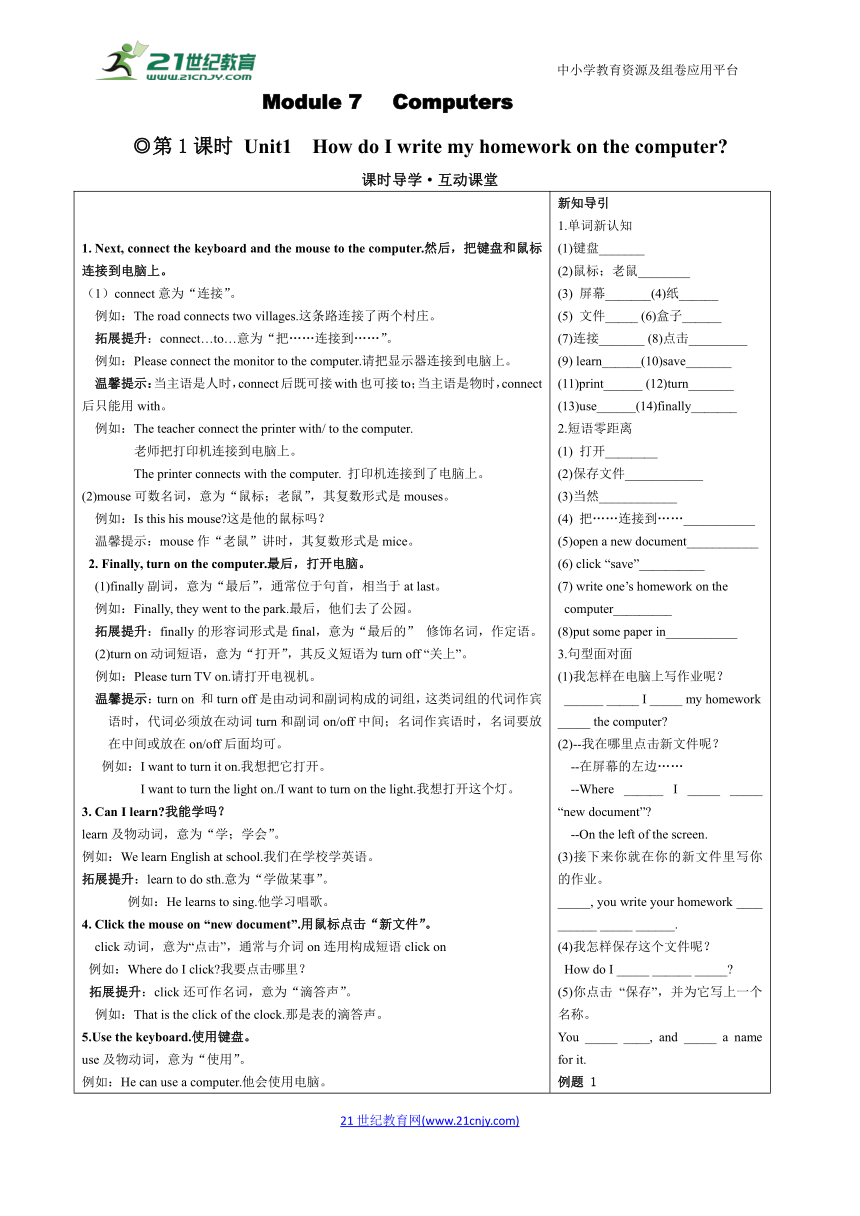
|
|
| 格式 | zip | ||
| 文件大小 | 1.3MB | ||
| 资源类型 | 试卷 | ||
| 版本资源 | 外研版 | ||
| 科目 | 英语 | ||
| 更新时间 | 2018-11-28 07:18:37 | ||
图片预览

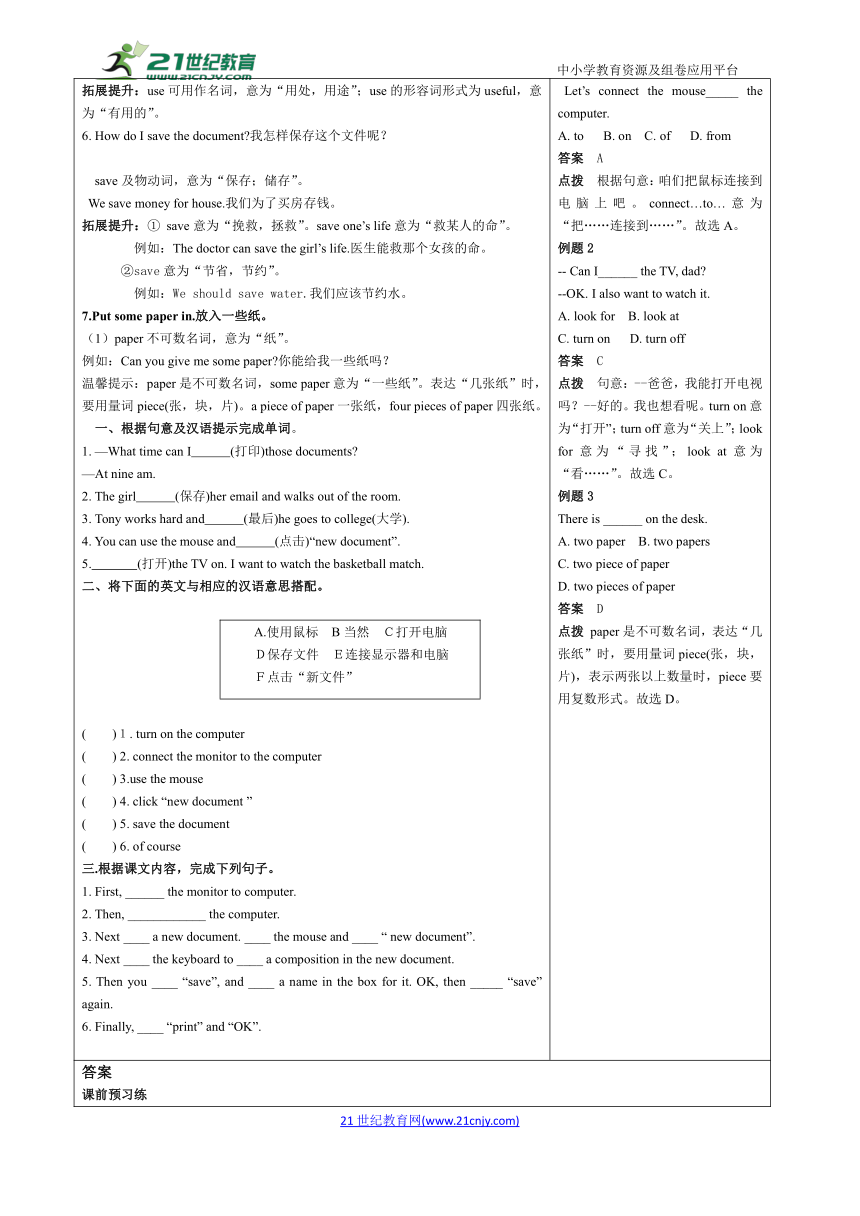
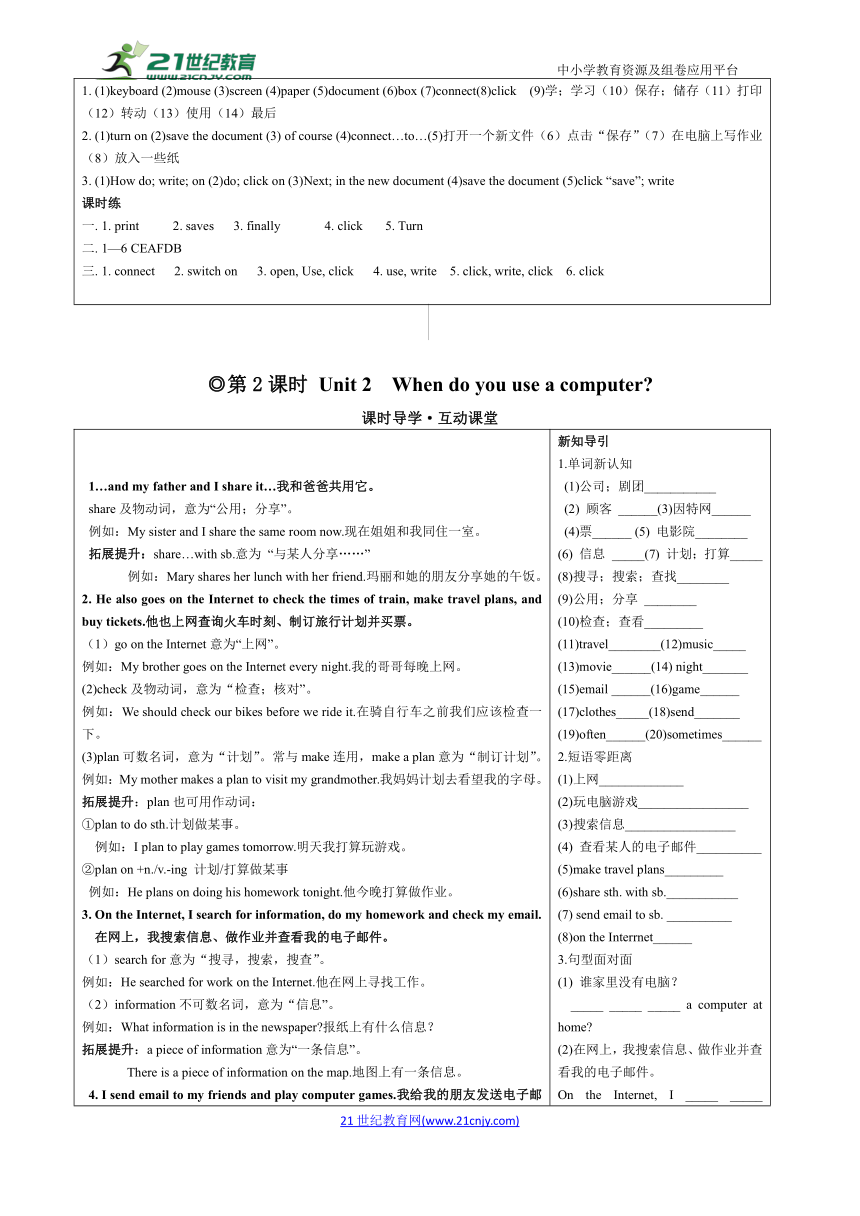
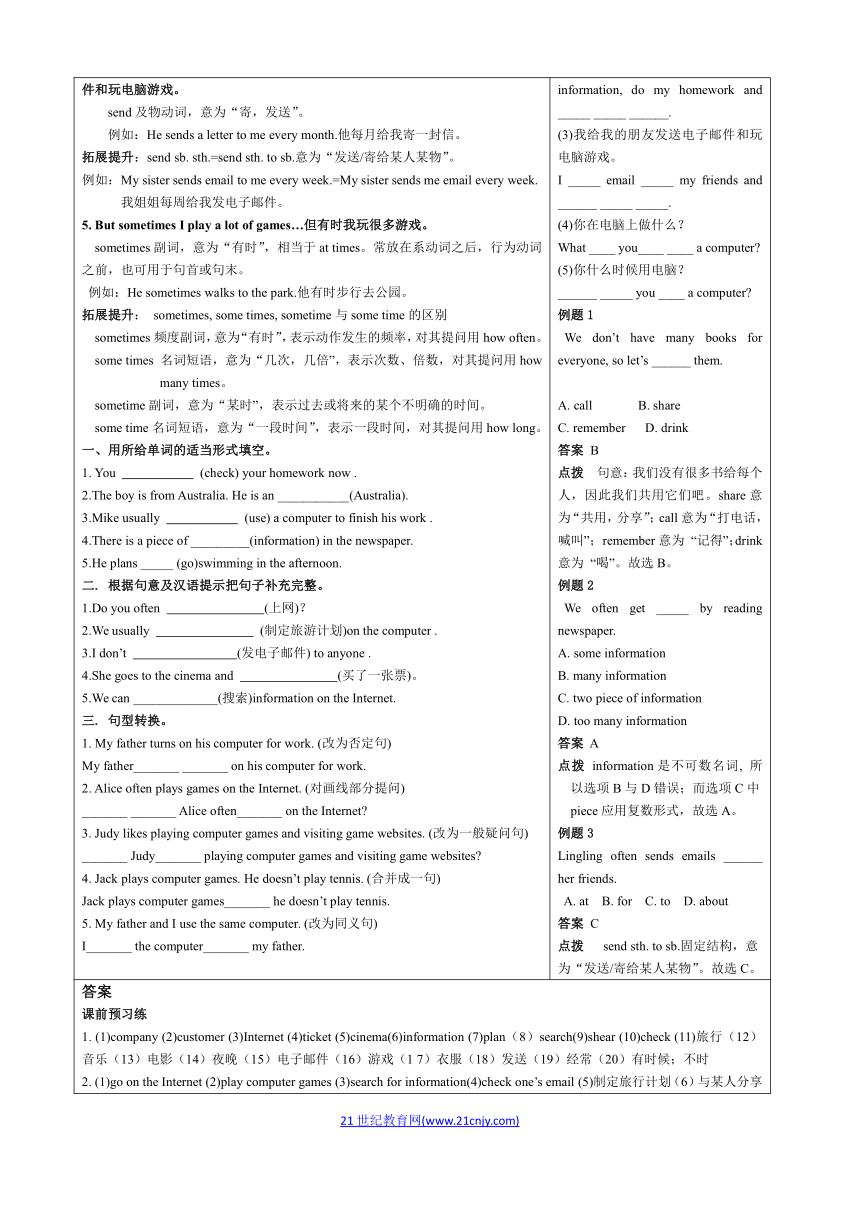
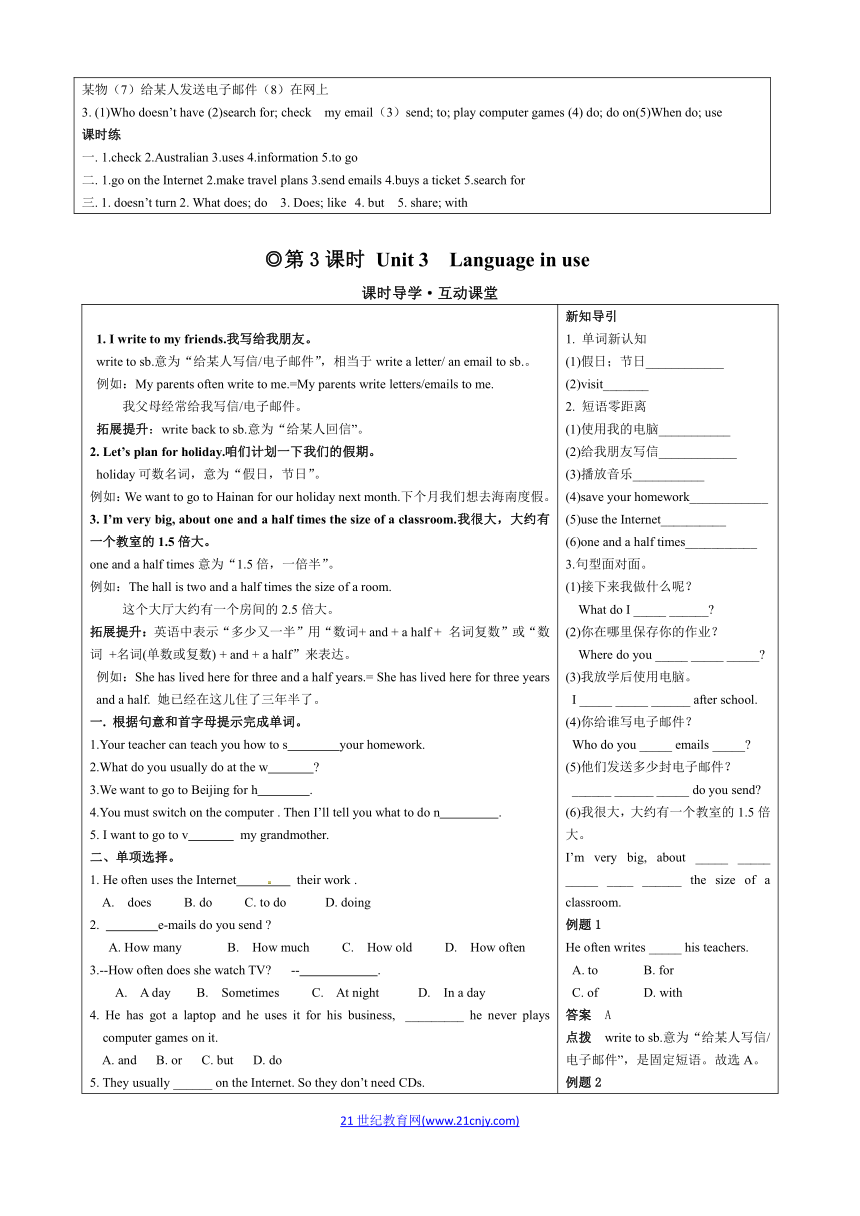
文档简介
中小学教育资源及组卷应用平台
Module 7 Computers
◎第1课时 Unit1 How do I write my homework on the computer?
课时导学·互动课堂
1. Next, connect the keyboard and the mouse to the computer.然后,把键盘和鼠标连接到电脑上。(1)connect意为“连接”。 例如:The road connects two villages.这条路连接了两个村庄。拓展提升:connect…to…意为“把……连接到……”。 例如:Please connect the monitor to the computer.请把显示器连接到电脑上。温馨提示:当主语是人时,connect后既可接with也可接to;当主语是物时,connect后只能用with。 例如:The teacher connect the printer with/ to the computer. 老师把打印机连接到电脑上。 The printer connects with the computer. 打印机连接到了电脑上。(2)mouse可数名词,意为“鼠标;老鼠”,其复数形式是mouses。 例如:Is this his mouse?这是他的鼠标吗? 温馨提示:mouse作“老鼠”讲时,其复数形式是mice。2. Finally, turn on the computer.最后,打开电脑。 (1)finally副词,意为“最后”,通常位于句首,相当于at last。例如:Finally, they went to the park.最后,他们去了公园。拓展提升:finally的形容词形式是final,意为“最后的” 修饰名词,作定语。 (2)turn on动词短语,意为“打开”,其反义短语为turn off “关上”。 例如:Please turn TV on.请打开电视机。温馨提示:turn on 和turn off是由动词和副词构成的词组,这类词组的代词作宾语时,代词必须放在动词turn和副词on/off中间;名词作宾语时,名词要放在中间或放在on/off后面均可。 例如:I want to turn it on.我想把它打开。 I want to turn the light on./I want to turn on the light.我想打开这个灯。3. Can I learn?我能学吗?learn及物动词,意为“学;学会”。例如:We learn English at school.我们在学校学英语。拓展提升:learn to do sth.意为“学做某事”。 例如:He learns to sing.他学习唱歌。4. Click the mouse on “new document”.用鼠标点击“新文件”。 click动词,意为“点击”,通常与介词on连用构成短语click on 例如:Where do I click?我要点击哪里?拓展提升:click还可作名词,意为“滴答声”。 例如:That is the click of the clock.那是表的滴答声。5.Use the keyboard.使用键盘。use及物动词,意为“使用”。例如:He can use a computer.他会使用电脑。拓展提升:use可用作名词,意为“用处,用途”;use的形容词形式为useful,意为“有用的”。6. How do I save the document?我怎样保存这个文件呢? save及物动词,意为“保存;储存”。 We save money for house.我们为了买房存钱。拓展提升:① save意为“挽救,拯救”。save one’s life意为“救某人的命”。 例如:The doctor can save the girl’s life.医生能救那个女孩的命。 ②save意为“节省,节约”。 例如:We should save water.我们应该节约水。7.Put some paper in.放入一些纸。(1)paper不可数名词,意为“纸”。例如:Can you give me some paper?你能给我一些纸吗? 温馨提示:paper是不可数名词,some paper意为“一些纸”。表达“几张纸”时,要用量词piece(张,块,片)。a piece of paper一张纸,four pieces of paper四张纸。 一、根据句意及汉语提示完成单词。1. —What time can I (打印)those documents? —At nine am. 2. The girl (保存)her email and walks out of the room. 3. Tony works hard and (最后)he goes to college(大学). 4. You can use the mouse and (点击)“new document”. 5. (打开)the TV on. I want to watch the basketball match. 二、将下面的英文与相应的汉语意思搭配。A.使用鼠标 B当然 C打开电脑 D保存文件 E连接显示器和电脑 F点击“新文件” ( )1. turn on the computer ( ) 2. connect the monitor to the computer ( ) 3.use the mouse ( ) 4. click “new document ” ( ) 5. save the document ( ) 6. of course 三.根据课文内容,完成下列句子。1. First, ______ the monitor to computer.2. Then, ____________ the computer. 3. Next ____ a new document. ____ the mouse and ____ “ new document”. 4. Next ____ the keyboard to ____ a composition in the new document. 5. Then you ____ “save”, and ____ a name in the box for it. OK, then _____ “save” again. 6. Finally, ____ “print” and “OK”. 新知导引1.单词新认知 (1)键盘_______(2)鼠标;老鼠________ (3) 屏幕_______(4)纸______ (5) 文件_____ (6)盒子______ (7)连接_______ (8)点击_________ (9) learn______(10)save_______ (11)print______ (12)turn_______ (13)use______(14)finally_______2.短语零距离 (1) 打开________ (2)保存文件____________ (3)当然____________ (4) 把……连接到……___________ (5)open a new document___________ (6) click “save”__________ (7) write one’s homework on the computer_________ (8)put some paper in___________ 3.句型面对面 (1)我怎样在电脑上写作业呢? ______ _____ I _____ my homework _____ the computer?(2)--我在哪里点击新文件呢? --在屏幕的左边…… --Where ______ I _____ _____ “new document”? --On the left of the screen. (3)接下来你就在你的新文件里写你的作业。 _____, you write your homework ____ ______ _____ ______. (4)我怎样保存这个文件呢? How do I _____ ______ _____? (5)你点击 “保存”,并为它写上一个名称。 You _____ ____, and _____ a name for it.例题 1 Let’s connect the mouse_____ the computer.A. to B. on C. of D. from答案 A点拨 根据句意:咱们把鼠标连接到电脑上吧。connect…to…意为“把……连接到……”。故选A。例题2 -- Can I______ the TV, dad? --OK. I also want to watch it. A. look for B. look at C. turn on D. turn off答案 C点拨 句意:--爸爸,我能打开电视吗?--好的。我也想看呢。turn on意为“打开”;turn off意为“关上”;look for意为“寻找”;look at意为“看……”。故选C。例题3There is ______ on the desk. A. two paper B. two papers C. two piece of paper D. two pieces of paper答案 D点拨 paper是不可数名词,表达“几张纸”时,要用量词piece(张,块,片),表示两张以上数量时,piece要用复数形式。故选D。
答案课前预习练1. (1)keyboard (2)mouse (3)screen (4)paper (5)document (6)box (7)connect(8)click (9)学;学习(10)保存;储存(11)打印(12)转动(13)使用(14)最后2. (1)turn on (2)save the document (3) of course (4)connect…to…(5)打开一个新文件(6)点击“保存”(7)在电脑上写作业(8)放入一些纸3. (1)How do; write; on (2)do; click on (3)Next; in the new document (4)save the document (5)click “save”; write课时练一. 1. print 2. saves 3. finally 4. click 5. Turn二. 1—6 CEAFDB三. 1. connect 2. switch on 3. open, Use, click 4. use, write 5. click, write, click 6. click
◎第2课时 Unit 2 When do you use a computer?
课时导学·互动课堂
1…and my father and I share it…我和爸爸共用它。share及物动词,意为“公用;分享”。 例如:My sister and I share the same room now.现在姐姐和我同住一室。拓展提升:share…with sb.意为 “与某人分享……” 例如:Mary shares her lunch with her friend.玛丽和她的朋友分享她的午饭。2. He also goes on the Internet to check the times of train, make travel plans, and buy tickets.他也上网查询火车时刻、制订旅行计划并买票。(1)go on the Internet意为“上网”。 例如:My brother goes on the Internet every night.我的哥哥每晚上网。 (2)check及物动词,意为“检查;核对”。 例如:We should check our bikes before we ride it.在骑自行车之前我们应该检查一下。 (3)plan可数名词,意为“计划”。常与make连用,make a plan意为“制订计划”。例如:My mother makes a plan to visit my grandmother.我妈妈计划去看望我的字母。拓展提升:plan也可用作动词: ①plan to do sth.计划做某事。 例如:I plan to play games tomorrow.明天我打算玩游戏。 ②plan on +n./v.-ing 计划/打算做某事 例如:He plans on doing his homework tonight.他今晚打算做作业。3. On the Internet, I search for information, do my homework and check my email. 在网上,我搜索信息、做作业并查看我的电子邮件。(1)search for意为“搜寻,搜索,搜查”。 例如:He searched for work on the Internet.他在网上寻找工作。(2)information不可数名词,意为“信息”。 例如:What information is in the newspaper?报纸上有什么信息?拓展提升:a piece of information意为“一条信息”。 There is a piece of information on the map.地图上有一条信息。 4. I send email to my friends and play computer games.我给我的朋友发送电子邮件和玩电脑游戏。send及物动词,意为“寄,发送”。 例如:He sends a letter to me every month.他每月给我寄一封信。拓展提升:send sb. sth.=send sth. to sb.意为“发送/寄给某人某物”。 例如:My sister sends email to me every week.=My sister sends me email every week. 我姐姐每周给我发电子邮件。5. But sometimes I play a lot of games…但有时我玩很多游戏。 sometimes副词,意为“有时”,相当于at times。常放在系动词之后,行为动词之前,也可用于句首或句末。 例如:He sometimes walks to the park.他有时步行去公园。拓展提升: sometimes, some times, sometime与some time的区别 sometimes频度副词,意为“有时”,表示动作发生的频率,对其提问用how often。 some times 名词短语,意为“几次,几倍”,表示次数、倍数,对其提问用how many times。 sometime副词,意为“某时”,表示过去或将来的某个不明确的时间。 some time名词短语,意为“一段时间”,表示一段时间,对其提问用how long。一、用所给单词的适当形式填空。1. You (check) your homework now . 2.The boy is from Australia. He is an ___________(Australia). 3.Mike usually (use) a computer to finish his work . 4.There is a piece of _________(information) in the newspaper. 5.He plans _____ (go)swimming in the afternoon.二. 根据句意及汉语提示把句子补充完整。1.Do you often (上网)? 2.We usually (制定旅游计划)on the computer . 3.I don’t (发电子邮件) to anyone . 4.She goes to the cinema and (买了一张票)。 5.We can _____________(搜索)information on the Internet.三. 句型转换。1. My father turns on his computer for work. (改为否定句) My father_______ _______ on his computer for work. 2. Alice often plays games on the Internet. (对画线部分提问) _______ _______ Alice often_______ on the Internet? 3. Judy likes playing computer games and visiting game websites. (改为一般疑问句) _______ Judy_______ playing computer games and visiting game websites? 4. Jack plays computer games. He doesn’t play tennis. (合并成一句) Jack plays computer games_______ he doesn’t play tennis. 5. My father and I use the same computer. (改为同义句) I_______ the computer_______ my father. 新知导引1.单词新认知 (1)公司;剧团___________ (2) 顾客 ______(3)因特网______ (4)票______ (5) 电影院________ (6) 信息 _____(7) 计划;打算_____ (8)搜寻;搜索;查找________(9)公用;分享 ________ (10)检查;查看_________(11)travel________(12)music_____ (13)movie______(14) night_______ (15)email ______(16)game______ (17)clothes_____(18)send_______ (19)often______(20)sometimes______2.短语零距离(1)上网_____________ (2)玩电脑游戏_________________ (3)搜索信息_________________ (4) 查看某人的电子邮件__________ (5)make travel plans_________ (6)share sth. with sb.___________ (7) send email to sb. __________ (8)on the Interrnet______3.句型面对面(1) 谁家里没有电脑? _____ _____ _____ a computer at home? (2)在网上,我搜索信息、做作业并查看我的电子邮件。 On the Internet, I _____ _____ information, do my homework and _____ _____ ______. (3)我给我的朋友发送电子邮件和玩电脑游戏。 I _____ email _____ my friends and ______ _____ _____. (4)你在电脑上做什么?What ____ you____ ____ a computer? (5)你什么时候用电脑? ______ _____ you ____ a computer?例题1 We don’t have many books for everyone, so let’s ______ them. A. call B. shareC. remember D. drink 答案 B点拨 句意:我们没有很多书给每个人,因此我们共用它们吧。share意为“共用,分享”;call意为“打电话,喊叫”; remember意为 “记得”;drink意为 “喝”。故选B。例题2 We often get _____ by reading newspaper.A. some information B. many information C. two piece of informationD. too many information答案 A点拨 information是不可数名词, 所以选项B与D错误;而选项C中piece应用复数形式,故选A。 例题3 Lingling often sends emails ______ her friends. A. at B. for C. to D. about答案 C点拨 send sth. to sb.固定结构,意为“发送/寄给某人某物”。故选C。
答案课前预习练1. (1)company (2)customer (3)Internet (4)ticket (5)cinema(6)information (7)plan(8)search(9)shear (10)check (11)旅行(12)音乐(13)电影(14)夜晚(15)电子邮件(16)游戏(1 7)衣服(18)发送(19)经常(20)有时候;不时2. (1)go on the Internet (2)play computer games (3)search for information(4)check one’s email (5)制定旅行计划(6)与某人分享某物(7)给某人发送电子邮件(8)在网上3. (1)Who doesn’t have (2)search for; check my email(3)send; to; play computer games (4) do; do on(5)When do; use课时练一. 1.check 2.Australian 3.uses 4.information 5.to go二. 1.go on the Internet 2.make travel plans 3.send emails 4.buys a ticket 5.search for三. 1. doesn’t turn 2. What does; do 3. Does; like 4. but 5. share; with
◎第3课时 Unit 3 Language in use
课时导学·互动课堂
1. I write to my friends.我写给我朋友。write to sb.意为“给某人写信/电子邮件”,相当于write a letter/ an email to sb.。 例如:My parents often write to me.=My parents write letters/emails to me. 我父母经常给我写信/电子邮件。拓展提升:write back to sb.意为“给某人回信”。2. Let’s plan for holiday.咱们计划一下我们的假期。 holiday可数名词,意为“假日,节日”。例如:We want to go to Hainan for our holiday next month.下个月我们想去海南度假。3. I’m very big, about one and a half times the size of a classroom.我很大,大约有一个教室的1.5倍大。one and a half times意为“1.5倍,一倍半”。 例如:The hall is two and a half times the size of a room. 这个大厅大约有一个房间的2.5倍大。拓展提升:英语中表示“多少又一半”用“数词+ and + a half + 名词复数”或“数词 +名词(单数或复数) + and + a half”来表达。 例如:She has lived here for three and a half years.= She has lived here for three years and a half. 她已经在这儿住了三年半了。一. 根据句意和首字母提示完成单词。1.Your teacher can teach you how to s your homework. 2.What do you usually do at the w ? 3.We want to go to Beijing for h . 4.You must switch on the computer . Then I’ll tell you what to do n . 5. I want to go to v my grandmother. 二、单项选择。1. He often uses the Internet their work . A. does B. do C. to do D. doing 2. e-mails do you send ? A. How many B. How much C. How old D. How often 3.--How often does she watch TV? -- . A. A day B. Sometimes C. At night D. In a day 4. He has got a laptop and he uses it for his business, _________ he never plays computer games on it. A. and B. or C. but D. do 5. They usually ______ on the Internet. So they don’t need CDs. A. go B. come C. do D. use三. 句型转换。1. Alice often listens to music in the evening. (改为一般疑问句) Alice often to music in the evening? 2. Betty uses the Internet to send emails. (对画线部分提问)______ ______ Betty use the Internet to do? 3. I often do some cleaning at home. (对画线部分提问)______ ______ you often do any cleaning? 4. They often do their homework on their computers. (改为否定句) They______often______ their homework on their computers. 5. Sometimes she goes to the zoo to visit the pandas. (对画线部分提问)______ ______ ______ she______ to the zoo to visit the pandas? 新知导引1. 单词新认知 (1)假日;节日____________ (2)visit_______2. 短语零距离 (1)使用我的电脑___________ (2)给我朋友写信____________ (3)播放音乐___________ (4)save your homework____________ (5)use the Internet__________ (6)one and a half times___________3.句型面对面。(1)接下来我做什么呢? What do I _____ ______? (2)你在哪里保存你的作业? Where do you _____ _____ _____? (3)我放学后使用电脑。I _____ _____ ______ after school. (4)你给谁写电子邮件?Who do you _____ emails _____? (5)他们发送多少封电子邮件? ______ ______ _____ do you send? (6)我很大,大约有一个教室的1.5倍大。I’m very big, about _____ _____ _____ ____ ______ the size of a classroom.例题1 He often writes _____ his teachers.A. to B. for C. of D. with答案 A点拨 write to sb.意为“给某人写信/电子邮件”,是固定短语。故选A。例题2 I have learnt English for _________.A. five year and a half B. five and a half yearC. five years and a half D. a half and five years答案 C点拨 句意“我学英语已经五年半了”,英语中表示“多少又一半”用“数词+ and + a half + 名词复数”或“数词 +名词(单数或复数) + and + a half”来表达。故选C。
答案课前预习练1. (1)holiday (2)探望;参观2. (1)use my computer (2)write to my friends (3)play music (4)保存你的作业(5)使用因特网(6)1.5倍/一倍半3.(1)do next (2)save your homework (3)use my computer (4)write; to (5) How many emails (6)one and a half times课时练一.1.save 2.weekends 3.holiday 4.next 5.visit二. 1—5 CABCA三. 1. Does; listen 2. What does 3. Where do 4. don’t; do 5. How often does; go
模块专题突破
专题归纳·语法透析
行为动词的一般现在时(三)我们在前面已经学习了行为动词的一般现在时的肯定句、否定句和一般疑问句。 下面学习行为动词的一般现在时的特殊疑问句。 1. 特殊疑问句的结构 特殊疑问句的结构为:“特殊疑问词 + 一般疑问句”。 例如:(1)_____ _____ you ______ your homework?你怎样完成你的家庭作业? 温馨提示:疑问词作主语时,语序不变,即为陈述句语序。 例如:(2)______ _______ breakfast for him?谁给他做早饭? 2. 特殊疑问句的回答特殊疑问句的回答不能用Yes或No来回答,要用陈述句回答。 例如:--What animal do you like? 你最喜欢什么动物? (3) --. .我喜欢熊猫。3. 特殊疑问词 常见的特殊疑问词有:where哪里(询问地点);when何时(询问时间);who谁(询问人);what什么(询问事物);how怎样(询问方式);why为什么(询问原因);which哪一个(询问选择)。 例如:(4)_______ ______ you go home?你怎样回家? (5) ______ _____ you like, oranges or bananas?你喜欢桔子还是香蕉? (6) _____ ______he have lessons?他什么时候上课? (7) _____ ______you Chinese?谁教你们语文? 常见的特殊疑问词组有:what time何时(询问具体时间);how often多久一次(询问频率);how old多大(询问年龄);how long多长时间(询问一段时间);how many多少(询问可数名词的量);how much多少(询问不可数名词的量)/多少钱(询问价格)。 例如:(8)______ _____ is it?几点了? (9) ______ ______ books have you got?你有多少本书? (10)_______ ______ is the chicken?鸡肉多少钱? 一、单项选择。1. --_____ do you like playing football? --Because it is very interesting. A. Why B. When C. What D. Which 2. --_____do you go to the park with your parents? --Once a month. A. How old B. What time C. How often D. How many3. --______ do I save the document? --Write a name for it, then click “save”. A. What B. When C. How D. Who 4. --______ can I print those document? --At nine. A. When B. What time C. What D. Which5. —_______ is milk ? — About 1.5 yuan. A . How many B. How much C. How old D. How二、选词填空。 1. — shares an apple with his friends? —Me. 2. — do you usually use a computer? —In the evening. 3. is Tim? I can’t find him. 4. — people are there in your family? —Six. 5. — is your grandmother? —She is well. Thanks. 三、句型转换。 1.Many people send emails to their friends on the Internet . (就划线部分提问) many people _______ on the Internet ? 2.They often download some test questions from the Internet . (就划线部分提问) _____they often_______ any test questions?3. these young people play computer games on the computer . usually ____ computer games on the computer ? (就划线部分提问) 4. My father usually uses the computer in the evening . (就划线部分提问) your fatherusually use the computer ?5.They go to work by bus. (就划线部分提问) _______ _____ they go to work?
语法透析
(1)How do; finish (2)Who cooks (3)I like the panda. (4)How do (5)Which do (6)When does (7)Who teaches(8)What time (9)How many (10)How much
语法练习
一、1—5 ACCBB
二、1. Who 2. When 3. Where 4. How many 5. How
三、1.What do; do 2. Where do; download
3.Who; play 4.When does 5.How do
专题讲座·聚焦写作
写作素材
1. more and more越来越多
2. at home 在家里
3.use computers to do sth.用电脑做某事
4. play games玩游戏
5.do one’s homework做家庭作业
6.send sth. to sb. 给某人发送某物
7.sometimes 有时
8. download music 下载音乐
典型例题
现在电脑越来越受欢迎, 已经走进了人们的日常生活, 并且在人们的生活中扮演着重要的角色, 请你写一篇英语短文, 谈谈你对电脑的认识, 及平时都用它做什么。
要求: 1. 词数60个左右;
2. 开头已给出, 不计入总词数。
Today the computer is more and more popular.
_______________________________________________________________________________
_______________________________________________________________________________
_______________________________________________________________________________
_______________________________________________________________________________
范文 Today the computer is more and more popular, many families have the computer at home. People use it to work, send emails, play games and so on. I often use it to (1)do my homework, and (2)send emails to my friends. (3)Sometimes I use it to (4)play games and download some music and films. I think it is very important and useful. 点评 (1) do one’s homework意为“做家庭作业。(2) send sth. to sb.意为“发送/寄给某人某物”。 相当于send sb. sth.。 (3) sometimes副词,意为“有时”,相当于at times。表示动作发生的频率,对其提问用how often。(4)play games意为“玩游戏”。
练习
现在很多家庭已经拥有了电脑,你经常用它做什么呢?请你以My Computer and I 为题来给同学们介绍一下。
要求:不少于50词。
______________________________________________________________________________________________________________________________________________________________________________________________________________________________________________________________________________________________________________________________________________________________________
One possible version:
My Computer and I
I have a computer. It's a nice present for my 13th birthday. Look!The monitor and the mouse are on the desk. I can do a lot of things on the computer. I can get a lot of news and information about the world. I can read books on the Internet and I can make a lot of friends from all over the world. I can download music,too. I like my computer.
how, how many, when,
where, who
HYPERLINK "http://21世纪教育网(www.21cnjy.com)
" 21世纪教育网(www.21cnjy.com)
同课章节目录
- Starte
- Module 1 My teacher and my friends
- Module 2 My English lesson
- Module 3 My English book
- Module 4 My everyday life
- Module 1 My classmates
- Unit 1 Nice to meet you.
- Unit 2 I'm Wang Lingling and I'm thirteen years ol
- Unit 3 Language in use.
- Module 2 My family
- Unit 1 Is this your mum?
- Unit 2 These are my parents.
- Unit 3 Language in use.
- Module 3 My school
- Unit 1 There are thirty students in my class.
- Unit 2 The library is on the left of the playgroun
- Unit 3 Language in use.
- Module 4 Healthy food
- Unit 1 We've got lots of apples.
- Unit 2 Is your food and drink healthy?
- Unit 3 Language in use.
- Module 5 My school day
- Unit 1 I love history.
- Unit 2 We start work at nine o'clock.
- Unit 3 Language in use.
- Revision module A
- Module 6 A trip to the zoo
- Unit 1 Does it eat meat?
- Unit 2 The tiger lives in Asia.
- Unit 3 Language in use.
- Module 7 Computers
- Unit 1 How do I write my homework on the computer?
- Unit 2 When do you use a computer?
- Unit 3 Language in use.
- Module 8 Choosing presents
- Unit 1 I always like birthday parties.
- Unit 2 She often goes to concerts.
- Unit 3 Language in use.
- Module 9 People and places
- Unit 1 We're enjoying the school trip a lot.
- Unit 2 They're waiting for buses or trains.
- Unit 3 Language in use.
- Module 10 Spring Festival
- Unit 1 Are you getting ready for Spring Festival?
- Unit 2 My mother's cleaning our houses and sweepin
- Unit 3 Language in use.
- Revision module B
